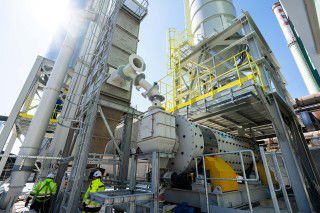This week we take a look at the price of Nigerian cement, which has soared in recent weeks, and possible solutions on the horizon.
Retail cement prices in the country reportedly rose from around NGN2400-2600/50kg bag (US$6.3-6.83) to NGN3500 at the end of April. Further rises have been reported: Kunle Adeyemi, CEO of Sterling Homes, stated on 4 May that prices had risen once more to NGN3800 over the course of one day.
The price increase has been attributed to climbing domestic demand combined with higher input costs for cement manufacturers, who are facing rising diesel prices and instability in gas supply. Furthermore, an unfavourable exchange rate has impacted costs adversely, according to Dangote Cement.
"Over the past 15 months, our production costs have gone up significantly. About 50 per cent of our costs are linked to USD so the cost of critical components like gas, gypsum, bags, and spare parts has increased significantly due to devaluation of the naira and VAT increases," explained Edwin Devakumar, group executive director at Dangote.
Domestic consumption has been stimulated by an improved housing market, commercial construction and government projects. As a result, Dangote Cement reported record cement sales of 4.9Mt, including exports, from its Nigerian operations in the first quarter of 2021, representing a rise of 22.1 per cent.
Amid reports that suggested Dangote was selling cement at a higher price in Nigeria than in its other markets, the producer noted that its ex-factory price in the country was between NGN2450 in Obajana and Gboko and NGN2510 in Ibese. In its 1Q21 financial report, Dangote also noted that its Nigerian ex-factory prices have remained stable since the end of 2019. To meet the rising demand and boost supply, the company suspended exports from its new terminals and reactivated capacity at its Gboko plant at the end of 2020. Cement exports by road have continued.
As another big player in the domestic market, BUA Cement released a statement, noting that it “has not and does not intend to increase its price of cement now or in the near future, barring any material, unforeseen circumstances”. Instead, it blamed the price hikes on market speculation by retailers.
“BUA Cement is very much aware of the fact that there is a huge difference in the ex-factory prices of cement and the retail market prices of cement, which is mostly because of retailers taking advantage of increased cement demand to make maximum profits,” continued the statement.
Conversely, cement dealers have blamed the scarcity of cement on producers failing to supply distributors with the requested quantities due to insufficient production, according to a report in The Punch. Although it is worth noting that cement producers only have control over ex-factory prices, not retail prices.
In a recent interview with This Day, Kunle Adeyemi said “I want to believe that the dealers have decided to create artificial scarcity to justify the increase in price.” Mr Adeyemi went on to discuss the serious implications of such a severe price hike, including the risk that developers may compromise on quality and building standards by purchasing cheaper, sub-standard building materials. He also called upon the government to regulate prices for essential building materials, such as cement and iron rods, as a potential solution.
Indeed, last month, lawmakers in the country criticised the dominance of the three main producers in the country, namely Dangote, Lafarge Africa and BUA Cement, and submitted a motion to the upper house Senate which called for a relaxing of licensing restrictions to encourage new entrants, create competition and drive down prices.
New capacity plans
Looking ahead, any issues with the lack of supply are likely to be resolved in the country over the coming months and years as producers are set to bring several large-scale production facilities on-stream.
This year, BUA is bringing its 3Mta Line 3 project online at its Kalambaina plant in Sokoto. In addition, it is expected to complete its 3Mta Line 4 works at Kalambaina within 30 months of its start date in 2021. Another 3Mta brownfield expansion at its Edo unit will also complete within 30 months, while its 3Mta greenfield plant in Adamawa is working to the same timeline.
Meanwhile, Dangote Cement increased its capacity at its Obajana facility by 3Mta in 2020 and its 3Mta Okpella plant is expected to be commissioned this year.
Upon completion, these new projects should settle the domestic market, lower cement prices and bring the opportunity of increased regional exports.
